I Was a “Hello Girl” - 1977
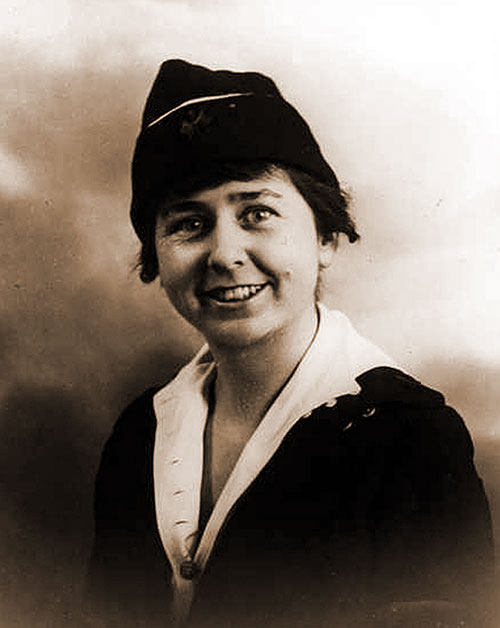
Grace D. Banker, Chief Telephone Operator, US Army Signal Corps, March 1918. GGA Image ID # 19976e83d3
What a strange thing the mind is—one minute absorbed in the present, the next racing down the years and pulling aside the curtains of the past to reveal scenes and people long forgotten.
Someone asked me about my work “overseas,” and in a second it was the first week in March, 1918, and I was back in a house on River Street, Hoboken. Thirty-three Signal Corps girls were there awaiting orders to sail for France.
The house in which we lived was once an immigrants’ boarding house. It was a cold and cheerless spot, though the rooms, with their long lines of army cots, were clean enough.
We shivered and resorted to setting-up exercises in the mornings to keep warm. Our meals were eaten in a funny little restaurant around the corner.
That first group of Signal Corps girls had come from all over the United States and from Canada. Some, like myself, were college girls ; some came from public schools, and some from private schools.
All spoke French, but almost none had had any telephone experience until they were trained for the overseas service by the Telephone Company.
Their ages ranged from 19 to 35. There was only one of the latter. I had always heard that “old” people were set in their ways, and it was with some misgivings that I discovered I had someone in my care so aged! I was still so young.
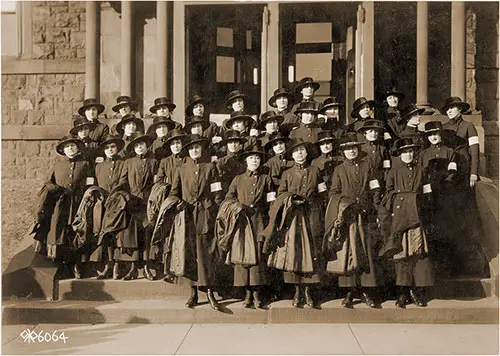
Telephone Operators Leaving for the War, 2 February 1918. Group of 33 Telephone Operators Proficient in French and English Attached to Signal Corps, U.S.A. Leaving for Duty "Somewhere in France." Detachment Comprises One Chief Operator, Four Supervisors, and Twenty-eight Operators. Miss Grace D. Banker, Chief Operator. Censored and Released 13 March 1918 by War College Division. National Archives and Records Administration, 111-SC-6066. NARA ID # 55173044. GGA Image ID # 199d636edd
March 6—sailing at last! Thirty-three Signal Corps girls in the trim navy- blue uniform and smart overseas cap prescribed by the Army War College at Washington. I was so proud of them. I was also very conscious of my heavy responsibilities. I had been put in charge of the unit.
Twelve days of life-boat drills on the old White Star liner Celtic, now a converted troopship. Three nights obeying orders and sleeping in our clothes. Stuck on a sandbar at the harbor of the Mersey River just outside of Liverpool, a target for German submarines all one moonlight night.
Then a week in Southampton, adjusting ourselves to wartime rations—saccharine instead of sugar, roasted barley in place of coffee, and no sweets to be had at any price.
Two days on a little channel packet caught in a dense fog between Southampton and Le Havre. Running Into a submarine net and narrowly missing being rammed by a French cruiser. What good sports the girls were in that First Unit ! They took everything in their stride. They were the pioneers.
In Paris we were divided into three groups : one to be stationed in Tours with the S.O.S., one to remain in Paris, and one to go with me to the Headquarters of the Advance Section at Chaumont sur Haute Marne.
The Chaumont office was in the stone military barracks called the Caserne. Those barracks had once been the headquarters of the Russian Army in France.
Now they were General Pershing’s headquarters. The telephone office was in a small room on the first floor. Corporal Farmer had been the chief operator and he now turned the work over to me.
Our home in Chaumont was a pleasant stone house on the Rue Brule near the edge of the town. Strange to say, it was more or less modern and boasted one of the few bathtubs in Chaumont. To be sure, during several water shortages there was not enough water to use it. Still it did give an air of respectability, and we were very proud of it.
General Pershing once made an inspection of our home while I was at Chaumont. Up and down three flights of stairs—he never missed a thing ! With a wave of my hand and a “This is the kitchen,” I would have passed it by, for there wasn’t any extra room when the cook and the maid were inside.
“I always like kitchens,” he said and went in and looked around. “C’est tres propre.” he remarked to the old cook, whereupon she bowed low and nearly burst with pride. Once when some of us saluted the General as he passed by, he turned to Colonel B. and said, "Those girls are real soldiers.”
Five months at Chaumont. More units of Signal Corps girls had arrived. Now offices had been opened in the Advance Section and more American lines had been built. The work settled down to a routine.
Suddenly, on August 25, 1918, I was ordered to proceed to the First Army Headquarters with Susanne Prevot and Esther Fresnel. Where those headquarters were I did not learn until after we had left Neufchateau, where we added Helen Hill, Mrs. Berthe Hunt and Marie Lange to the group. We found we were headed for the town of Ligny-en-Barrois.
Unlike Chaumont, Ligny lies in a valley ringed about with hills, but the same Rhine Marne Canal which we used to see near Chaumont flows through Ligny and we soon felt quite at home.
All night long the streets of Ligny gave back the sound of marching feet and the camions and artillery added their rumble. They told us we were about five miles south of St. Mihiel; whether that were true or not, we certainly were not far off.
Our office was in a house on the main street. Sandbags piled high on the outside gave it a warlike appearance. Within, the office was bare enough—a few switchboards behind which were still piled rolls of wire and kegs of nails. A large packing box also stood there; for days it served as a combination chair-desk.
Only five girls besides myself—not enough to give 24-hour service except in emergencies. At first some of the Signal Battalion boys helped us out at night. The work was fascinating ; much of it was in codes changed frequently.
Ligny was “Waterfall.” Toul might be “Podunk” one day and "Wabash” the next. The Fourth Corps was known as “Nemo,” etc. Once in the mad rush of work I heard one of the girls say desperately, “Can’t I get Uncle?” and another, “No, I didn’t get Jam.” It all sounded like the Mad Hatter in Alice in Wonderland.
I doubt if anyone else could picture how terrific the work was just before a drive started. Everybody worked hard, yet no one seemed to complain. The excitement carried us along.
The night before the St. Mihiel drive opened, I sent two of the girls home in the early evening, and the last three at 10:30 p.m. I stayed on with the Signal boys, who were going to spell us off for a few hours.
At 11:30 p.m. I started home. In bed by midnight, I was awakened about 1:30 a.m. by the low roar of the guns. Soon after 2:00 a.m. I was back in the office with the girls who had left on the earlier shift the night before. We took over the boards.
Most of the Signal Corps officers—Colonel Hitt, Captain Keller, Lieutenants Finer and Burgess—were still there at 5 :00 that morning. No one could tell what might happen next; it was like an exciting game—I couldn’t leave. But at 9:30 that night Captain Keller pushed me out of the office, and I went home.
“Home” in Ligny was very French and very unpretentious. One entered a dark, narrow passageway off the main street. It led into a tiny, paved courtyard. From the center of one side of this court rose two well-worn stairways leading in opposite directions, one to two rooms over a shop, and the other to two rooms over an empty barn.
The barn was used for storing herbs, old clocks and tables. My room was over the barn, in the rear. Strange to relate, it contained an old maroon-colored canopy bed. Over this hung, like a sword of Damocles, a cross of dried flowers at least a foot high.
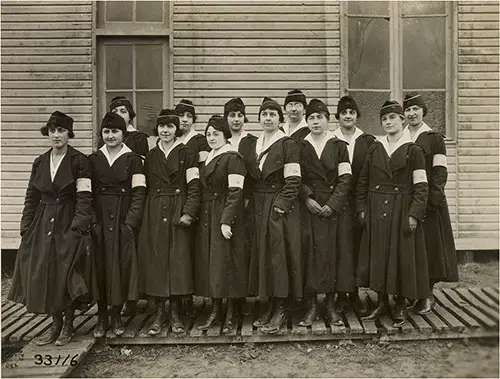
Phone Girls on Duty at Chief Signal Corps Office Headquarters at Souilly, Meuse, France, 15 November 1918. Left to Right: Ester V. Fresnel, Yonkers, NY; Leonie C. Peyron, Los Angeles, CA; Marie Flood, Chicago, IL; Marie D. Belanger, Rochester, NY; Grace D. Banker, Passic, NJ; Jennie R. Young, Seattle, WA; Suzanne Prevot, NYC; Marie Lange, San Francisco, CA; Louise Beraud, Houston, TX; B. Hunt, San Francisco, CA; and Bertha Arlaud, Brooklyn, NY. Photograph by Pvt. T. R. Shaw, Signal Corps. Passed by AEF Censor, Date Not Given. National Archives and Records Administration, 111-SC-33116. NARA ID # 55225379. GGA Image ID # 199d53318c
On September 20 we left Ligny, traveling light with only suitcases. The First Army Headquarters were moving north of Bar-le-Duc to Souilly—not the Souilly so many knew at the time of the Armistice.
The Army Headquarters in September were in the so-called Armee Adrienne Barracks, those ancient wooden sheds, relics of 1914 when the French held Verdun against the terrific assaults of the Germans.
They were flimsy affairs set down in a sea of mud on the edge of the village. They looked dilapidated enough. Instead of glass windows they had frames covered with a sort of oiled paper. In the daytime these could be pushed out something like a window in a chicken coop.
At night they were hooked down and covered with a black cloth called the “camouflage,” lest a stray beam of light announce our presence to the raiding German planes.
These funny old barracks proved to be fairly safe, though, for while the “Boches” came over us and bombed Bar-le-Duc and Ligny, we were spared. We had an “abri” for shelter, and there was another abri far down in the ground where a single switchboard stood ready for any emergency.
The barracks roof leaked in the autumn rains. The weather was cold, for winter comes early in the hills about Verdun. By October there was ice on the water pails in the morning.
Once I froze my feét badly without even going out of the barracks. I had been working long hours with very little sleep. Before a drive I seldom had more than two or three hours of rest.
Consequently, when I tumbled into bed at night, I never noticed anything until my feet began to swell and then I discovered that the bed covers were soaking wet from a leak in the roof overhead.
It was a long time before I could wear shoes again. Of course I moved the bed, but, although I moved it several times, I never found a place where there wasn’t at least one leak.
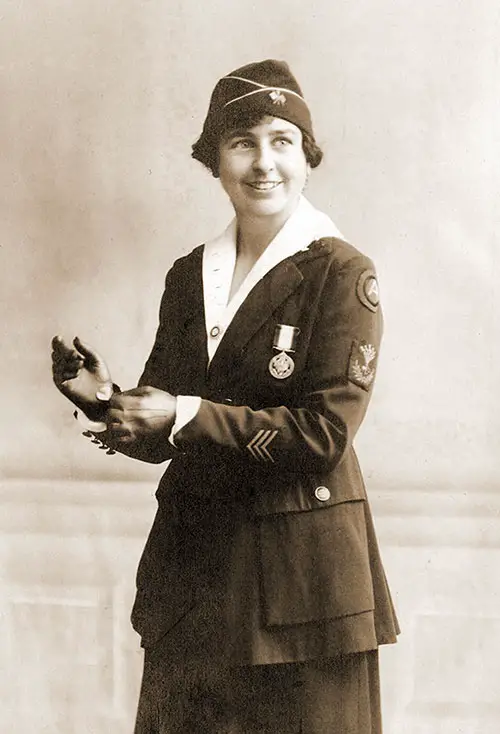
Chief Operator, US Army Signal Corps Telephone Operators, Shown Here Shortly After Receiving the Distinguished Service Medal in Coblenz, Germany on 22 May 1919. Official US Army Signal Corps Photograph. GGA Image ID # 19ad61fc34
I kept thinking of the boys in the trenches. They were so much worse off. We didn’t really suffer ; we had plenty of warm food ; we were happy in our work ; and we had fine officers to work for. The Signal Corps officers at the First Army were very thoughtful— they watched over us carefully.
The office was in the center of Number 8 Barracks. It had only two switchboards of the portable army type. It had 24-hour service to G3, the “Operations Section.” The codes changed more frequently than ever. We were “Widewing.” Widewing 10 meant a call for the Chief Signal Officer at Souilly.
The girls had to speak both French and English and they also had to understand American doughboy French. “Benoity Vox” was the average American soldier’s way of asking for the French town of Benoîte Vaux. The wire chief helped me, and I helped him.
Day after day the ambulances drove past the headquarters and over to the evacuation hospital in the woods beyond. I once had to go over there for treatment. But I saw too much. There is no glory in war!
The great Are at Souilly broke out on October 30. Six or seven barracks including our own went up in smoke like so many tinderboxes. The men and officers worked like mad, but a bucket brigade was powerless.
Only the smoldering embers remained of “Number Eight.” Everyone offered us a home. The French boys offered to run our offices until we could get settled. G4 took us in for dinner.
The office was saved, thanks to the Signal Battalion and the officers and others. Luckily for the office, it had been moved to another barracks across the way a few days before.
Still, the new office had a narrow squeak. The men poured pails of water on the roof, but even then for a while it looked as though it were doomed. Wires went down—the telephone line was “out”.
In November new travel orders came to me. I was to go forward with a tiny group of girls to Dun-sur-Meuse where the next headquarters would be.
Mrs. Hunt was to be left in charge of the new girls who had arrived to take over the work in Souilly, but three days later the Armistice was signed and the orders were countermanded.
The night before the actual signing of the Armistice, I was on duty in the office. Suddenly the door opened. Half skipping, in a sort of lockstep formation, in came all the French boys from their office beyond.
In answer to my expressed amazement le Sergent Alexandre said, “La guerre est finie!” Then In English, “I could jump up and hit the ceiling !”
Our work with the First Army was at an end. But first we were to have a “leave.” After nearly three months of strenuous work when for days on end I was on duty anywhere from 12 to 20 hours a day, a “leave” sounded very attractive.
I started for Nice. Alas! No sooner had I reached that delightful spot than I received orders recalling me to Paris. Tours and the S.O.S. had caught up at last!
Hotel life in Paris and all the comforts again, but we didn’t appreciate it at all! We missed the First Army with its code of loyalty and hard work.
We were back in the petty squabbles of civilian life where even chief operators had “tantrums,” and where the wives of civilians attached to the Peace Conference spilled all over Paris in army cars.
President Wilson came back to Paris the second time. I was given charge of the work in his home on the Avenue des Etats-Unis. I was sorry to leave the girls at La Belle Epine where I had been on duty while I was in Paris.
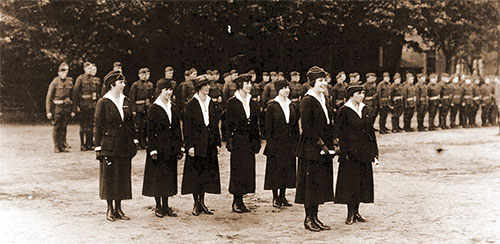
Signal Corps Girls Receiving Recognition for the Work at the US Army Base Mainstrom, circa 1919. Back Row, First from Left is Grace D. Banker. GGA Image ID # 1997739222
The work at the President’s house was not particularly exciting; so when a choice came to stay or go to the Army of Occupation at Coblenz, Germany, I left Paris and went to the Rhine.
At Coblenz I received the Distinguished Service Medal, the citation reading : “For exceptionally meritorious and distinguished services. She served with exceptional ability as Chief Operator in the Signal Corps Exchange at General Headquarters, American Expeditionary Forces, and later in a similar capacity at First Army Headquarters. By untiring devotion to her exacting duties under trying conditions she did much to assure the success of the telephone service during the operations of the First Army against the Saint Mihiel salient and the operations to the north of Verdun.”
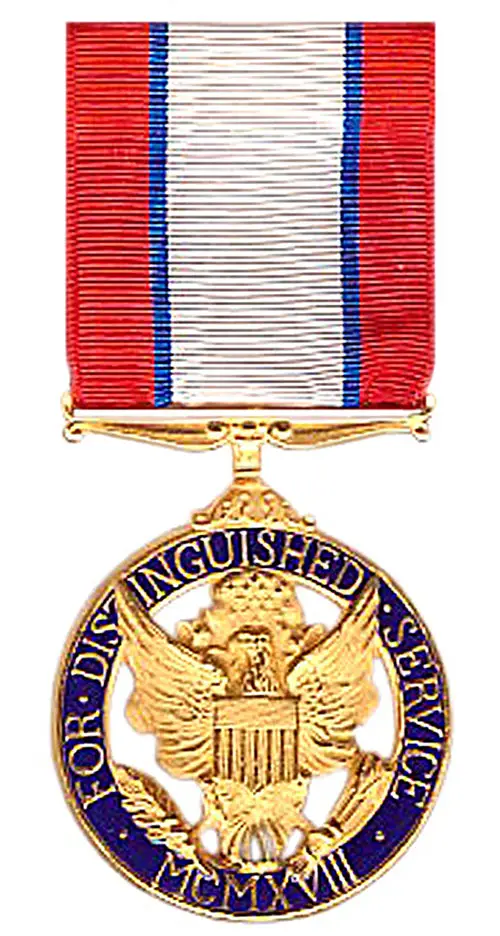
Distinguished Service Medal from World War 1 That Grace D. Banker Would Have Received in Coblenz, Germany. GGA Image ID # 19ae6dfa52
Whatever glory may go with that medal I have always felt belongs in large measure to the very small, but very loyal and devoted group of First Army girls—Susanne Prevot, Berthe Hunt, Adele Hoppock, Esther Fresnel, Helen Hill and Marie Lange.
Early in September, 1919, when the Armistice was about ten months old, with three service stripes on my sleeve, I sailed for home. I had enlisted for the “duration of the war.” For me that had meant 20 months in the Service.
Grace Banker Paddock, "I Was a 'Hello Girl'," in Recognition for Purposes of VA Benefits, Hearing before the Committee on Veterans' Affairs, Unted States Senate, Ninety-Fifth Congress, First Session on S. 247, S. 1414, S. 129, and Related Bills. Washington, DC: US Government Printing Office, 25 May 1977. pp. 13-16
